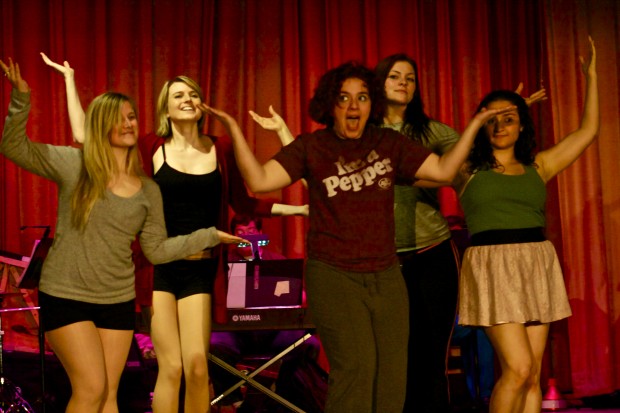 An amusement park, a storage facility and a dollar store are all within walking distance of the Block Institute on a near desolate stretch of space on Bay 44 street and Shore Parkway in Brooklyn.
An amusement park, a storage facility and a dollar store are all within walking distance of the Block Institute on a near desolate stretch of space on Bay 44 street and Shore Parkway in Brooklyn.
It’s the last place you’d expect to see an Off-Off Broadway performance.
Nevertheless, “The Block” is the home of the Genesis Repertory, a theatre company focused on the development of classical theatre in Brooklyn. The company performed Romeo and Juliet last spring and just finished a run of Guys and Dolls this month.
With less grants and smaller budgets, it’s never been more difficult to put on a production in New York City. This is a problem that many independent theatre companies face today.
Genesis is different however. They do it all without a dime in their expense account.
Void of government grants after they left Manhattan a few years ago, the troupe has found a way to get almost everything for nothing. And they’ve still managed to garner solid reviews for their work from NYTheatre.com and The New York Times.
Unlike many Broadway and Off-Broadway productions, which operate with performing budgets, Off-Off-Broadway productions typically live fundraiser-to-fundraiser, week-to-week and hand-to-mouth.
More than two-thirds of the productions cost under $20,000, according to a study performed by the New York Innovative Theatre Foundation.
“It is immensely difficult,” said Jay Michaels, Genesis President and Managing Producer. “Because of that, every reward means that much more. The fact that we’re able to spend two dollars like it’s 200- the joy of that is incredible.”
Even more incredible, the company has secured the scenery and costumes, two of the most important facets of any theatrical production for this production for little cost or for free.
The HFP Players in Staten Island, another local theatre group, provided Genesis with the lighting for their show, free of charge. The Brooklyn Association for the Performing Arts gave additional lighting and provided the set and curtains. The TDF costume collection in the city lent out the costumes, also free of charge.
“Are we tired? Are we exhausted? Are we panting? Do we tremble? Yes,” said Michaels. “But when the costumes come in, when you’re in run-throughs, when the artistic director starts the overture, we know we did this in less money than some people use in a week. It’s amazing.”
In addition to being thrifty and taking advantage of every opportunity, there’s an equal amount of personal sacrifice that goes along with it all as well. Mary Elizabeth Micari, Genesis Repertory’s mother hen and artistic director, had to personally fit every cast member over the course of one afternoon.
“I was there for 10 hours on a shoestring budget, but I love it,” said Micari, who is also married to Michaels. “These are the things you have to do when you don’t have funds, but it ultimately makes you more creative and pushes you. I did a pretty good performance of Richard III for $75. It can be done.”
The relationships Michaels and Micari have developed over the years have helped them cast actors and contact agents to book performers as well. Working in public relations, Michaels is well aware of the added exposure and contacts on social networking websites such as Twitter and Facebook.
Many of the actors have just begun to look for opportunities outside of community theatre and will work for experience rather than pay. Others are trained professionals who receive a stipend from Actors Equity that pays for their travel expenses and other small incidentals.
There are certain things the troupe has to pay for though. A director and a musical director, even for a small production, can run anywhere from $1,500 to $5,000 each.
The theater charges $15 to $18 a ticket and can hold up to 150 people a night. The company has to sell about half the tickets to all six performances in its upcoming run just to break even.
“Our ticket sales are everything,” said Christine Kahaly, the repertory’s director of operations. “We haven’t gotten the grants we needed from local politicians. We make it work through ticket sales and donations. We’re used to it now.”
Rather than bicker and complain about their lack of funds, Genesis has done some creative things to keep their theatre alive and interesting. For instance, their performance of Guys and Dolls has a smaller cast and is more burlesque and less cartoony than the original.
They also raise money with an acting school taught by company member John Stillwaggon. For $300.00, students can learn the basics over the span of a few weeks. Afterward, the students perform in front of an audience for a weekend. Genesis charges admission to the event as well.
Through this type of ingenuity and hard work, Michaels, MiCari and Kahaly have helped keep theatre in Brooklyn alive.
“When you have a family, you don’t think, ‘I can’t give them the best food, so I won’t,'” said Michaels. “You figure out how you’re going to. It’s the same thing here. We’re artists and regardless of if we succeed or not, we put on the very best show possible.”


Leave a Reply